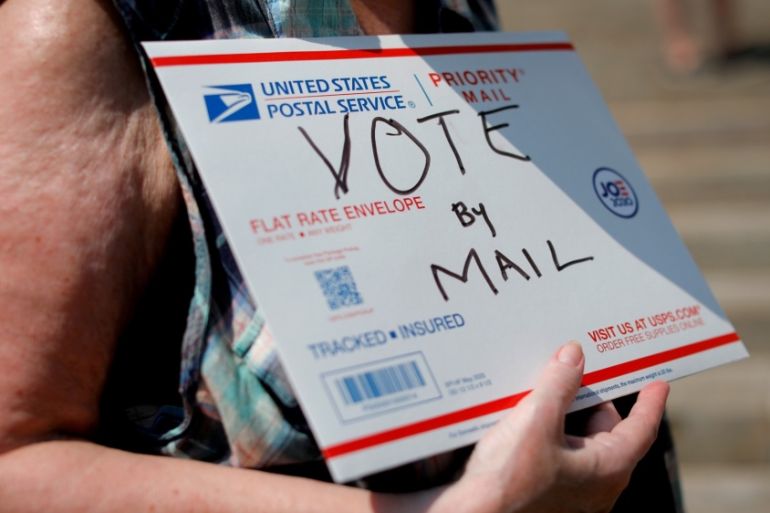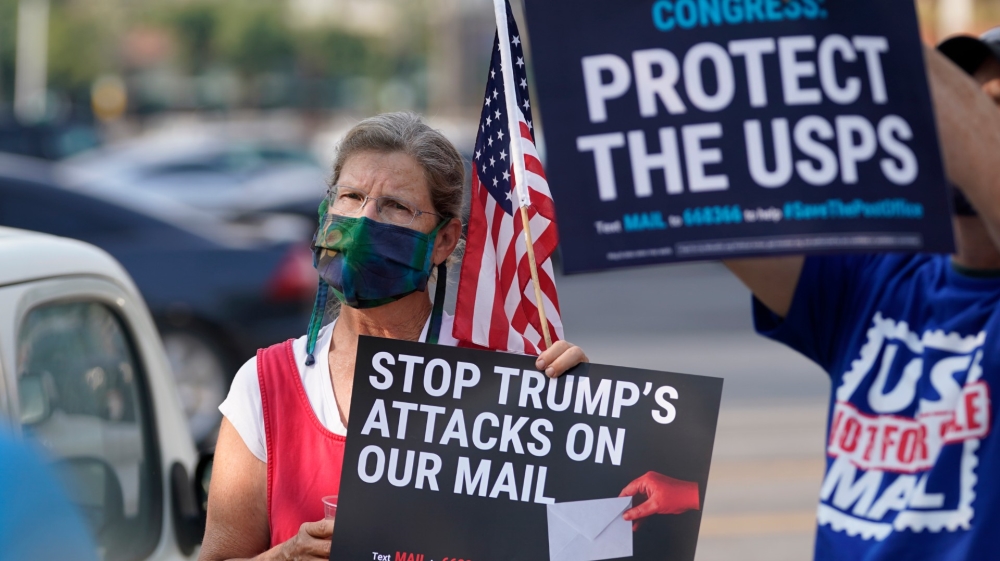US judge blocks changes to postal service that slowed mail
Judge Stanley Bastian says Postal Service changes were ‘a politically motivated attack’ before the US elections.

A US judge has blocked controversial Postal Service changes that have slowed mail nationwide, calling them “a politically motivated attack on the efficiency” of the service before the November election.
Judge Stanley Bastian in Yakima, Washington, said he was issuing a nationwide preliminary injunction sought by 14 states that sued the Trump administration and the US Postal Service.
Keep reading
list of 4 items‘Insurrection’ should bar Donald Trump from US presidency, lawyers argue
Ex-Proud Boys leader Joseph Biggs sentenced to 17 years for US Capitol riot
Trump indictments: Key court dates set in Georgia, federal election cases
The states challenged the Postal Service’s so-called “leave mail behind” policy, by which trucks have been leaving postal facilities on time whether or not there is more mail to load.
They also sought to force the Postal Service to treat election mail as First Class mail.
“The states have demonstrated the defendants are involved in a politically motivated attack on the efficiency of the Postal Service,” Bastian said on Thursday.
|
|
The judge said he would issue a written order later in the day, but that it would be substantially the same as that sought by the states.
He also said the changes created “a substantial possibility many voters will be disenfranchised”.
In a declaration filed along with the original motion, information technology consultant Mynor Urizar-Hunter, who helped start a website tracking the USPS changes, noted that 78 percent of the machines slated for removal were in counties won by Democrat Hillary Clinton in 2016.
“Despite overwhelming evidence of the safety and security of mail-in voting, President Trump has waged a months-long crusade to undermine mail-in voting,” the states wrote. “The changes at issue escalate this crusade by creating a substantial likelihood that the states will not be able to deliver, receive, and tally ballots cast in time to be counted.”

Following a national uproar, Postmaster General Louis DeJoy, a major donor to Trump and the Republican Party, announced he was suspending some changes – including the removal of iconic blue mailboxes in many cities and the decommissioning of mail processing machines.
But others remained in place, and the states – including the battlegrounds of Michigan, Wisconsin and Nevada – sued to have those undone as well.
The other states suing include Washington, Colorado, Connecticut, Illinois, Maryland, Minnesota, New Mexico, Oregon, Rhode Island, Vermont and Virginia – all led by Democratic attorneys general.
Other lawsuits over the changes have been brought in New York and Pennsylvania, where that state’s high court issued several rulings on Thursday.
‘A victory’
In perhaps the most impactful decision, the Pennsylvania Supreme Court ruled that state officials dealing with a surge in mail-in ballots due to the coronavirus pandemic can accept them up to three days after the November 3 election, as long as they were mailed by Election Day.
The ruling granted a request by the state Democratic Party that arose in part from concerns that postal delivery delays could disenfranchise voters.
The court ruled that late ballots can be accepted if they are postmarked by Election Day, or if they lack a legible postmark, “unless a preponderance of the evidence demonstrates that it was mailed after Election Day”.
|
|
The court also ruled that state law allows counties to collect absentee ballots using drop boxes and upheld a statute requiring poll watchers to reside in the county where they are stationed. In both cases, Republicans had sought to overturn those provisions.
“This is a victory that will help ensure that every eligible voter will more easily be able to cast their ballot and have it counted fairly,” Pennsylvania’s Democratic governor, Tom Wolf, and attorney general, Josh Shapiro, said in a joint statement.
The court ruled in a third case that state law prohibits third parties from collecting and returning ballots for voters, a practice sometimes derisively known as “ballot harvesting” that Republicans oppose.
In a separate case, the court‘s Democratic majority also rejected a bid from the Green Party to add its presidential and vice presidential candidates, Howie Hawkins and Angela Walker, to November’s ballot, ruling that the party’s paperwork was flawed under state law.
Democrats had worried that a third-party candidate could siphon support from Biden, while elections officials had warned that forcing them to reprint hundreds of thousands of ballots could create massive confusion and delay.
Pennsylvania is one of a handful of important swing states that both parties consider crucial to winning this year’s election.
